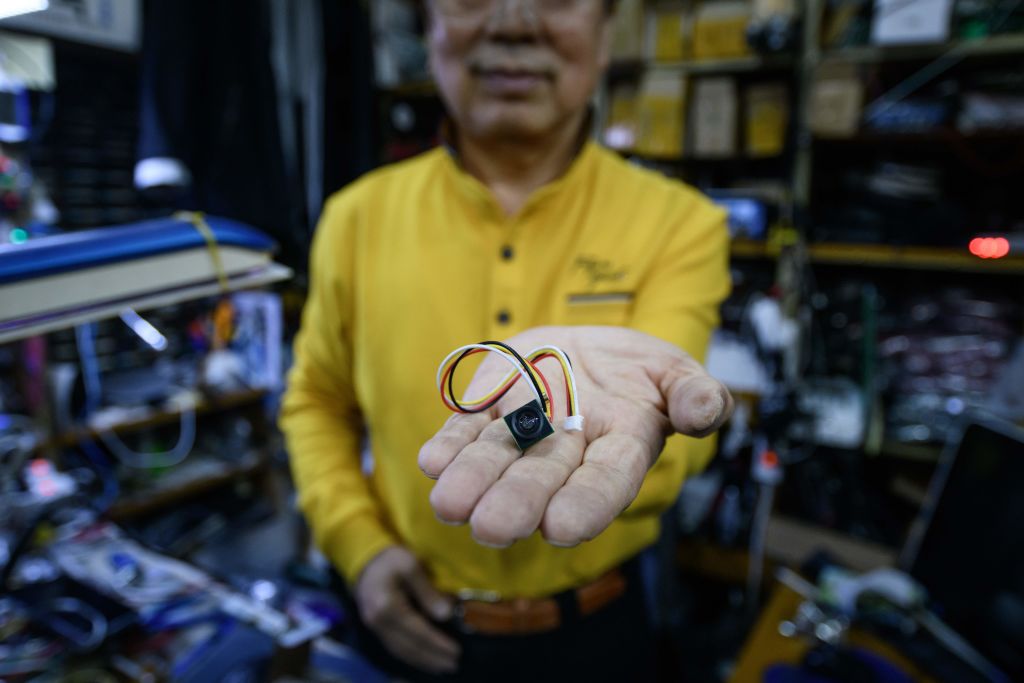Co-published by TIME and Field of Vision, the documentary Open Shutters follows Jieun Choi, a journalist in South Korea investigating the country’s plague of spycams. Targeted mostly at women, these tiny cameras are hidden in public restrooms, hotels, and changing rooms. The images they record are uploaded to websites, where men pay to access them.
These endemic violations of privacy have traumatized women across the country. More than 30,000 cases of filming with the use of hidden cameras were reported to police in South Korea between 2013 and 2018, according to media reports. Choi herself was a target. When a police officer rang her doorbell late one night, she found out that she was being filmed through her apartment window by a man on the rooftop of a nearby building.
Under the banner “My life is not your porn,” tens of thousands of women turned out in 2018 in the capital Seoul to protest illegal filming. The protests prompted the government to enact some reforms. But the rights group Human Rights Watch (HRW) said in a June 2021 report that it remained difficult for women and girls targeted in digital sex crimes to get justice—a problem that Choi also faces. In 2019, prosecutors dropped 43.5% of sexual digital crimes cases, HRW says.
TIME spoke with Seoul-based Youjin Do, the director and producer of Open Shutters, to learn more about her film.

Why did you want to make a film about this issue?
A couple of months after what happened, [Choi, who was formerly a colleague of Do] suddenly texted me and said, “We’ve got to make a documentary about what happened to me. Can you do that for me?” She said, “I want to take ownership of the story. I don’t want to stay as a victim.” She was really determined, really brave.
What inspired me personally was that I spent my twenties outside of South Korea and I wasn’t there for the reboot of the feminism movement, which started around 2015 or 2016. Then, all my friends in South Korea, they started talking about feminism suddenly. I felt super indebted. My little sister lives in South Korea and I hadn’t done anything to make her life better at that moment.
READ MORE: How #MeToo Is Taking on a Life of Its Own in Asia
Did you change your behavior after you started learning about spycam issues? Did you do anything to protect yourself?
Every time I walked into a public toilet, I started looking around for tiny holes. It’s not hard to find them, I didn’t have to work hard. They’re literally everywhere.
And when I see the effort other women have made to cover a hole—there are tissues stuck inside some, some are covered by scotch tape, some have marker drawn on them—it breaks my heart. Why do we have to do this? This is f-cking crazy.

What progress has been made on the issue since your film was made?
I strongly believe the big protests [in 2018] made huge, huge changes. With that, so many brave women like [Choi] started speaking up and many media organizations started covering this.
I think there have been two major changes. The first one is how Korean society sees this issue. Back then, if some guy took a photo of a woman on the subway and posted it online and said, “Hey look at these legs,” no one thought that it was awful. But after all the protests and media started talking about it finally people started saying, “Huh, this is really awful.”
READ MORE: How History Puts Asian Women in America at Risk
The language people have used to talk about it has changed too. “Molka” is a shortened version of the Korean expression of “Mollae camera” which means secretly filming someone. The term was widely used in news coverage of the protests [but] it often had a mischievous connotation, like a prank or hidden camera stunt. Now most of the Korean media and society use “Illegal filming” instead of “molka.”
There were also some changes in our legal system. Lawmakers finally started introducing legislation to strengthen penalties and to protect and support victims. The government started establishing centers to help victims of illegal filming.
Why do you think that these kinds of crimes are so prevalent in South Korea?
Lack of awareness of gender equality. If you look at statistics related to gender equality in South Korea, you’ll see us at the bottom of the chart. Among developed countries we are at the bottom of the bottom. It’s a really weird situation. When it comes to GDP or our cultural influence—Squid Game and BTS and that kind of stuff—it looks like South Korea is a developed country. But when it comes to gender equality, it’s unspeakable. It’s just awful. I can’t understand why this is happening.
Do you still look around every time you go into a public bathroom?
Yes. We are not safe.
This interview has been edited for length and clarity.
—With reporting by Aria Chen / Hong Kong.
More Must-Reads from TIME
- Breaking Down the 2024 Election Calendar
- How Nayib Bukele’s ‘Iron Fist’ Has Transformed El Salvador
- What if Ultra-Processed Foods Aren’t as Bad as You Think?
- How Ukraine Beat Russia in the Battle of the Black Sea
- Long COVID Looks Different in Kids
- How Project 2025 Would Jeopardize Americans’ Health
- What a $129 Frying Pan Says About America’s Eating Habits
- The 32 Most Anticipated Books of Fall 2024
Write to Amy Gunia at amy.gunia@time.com